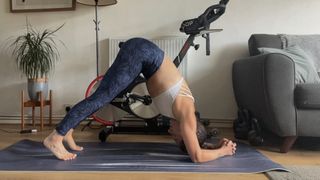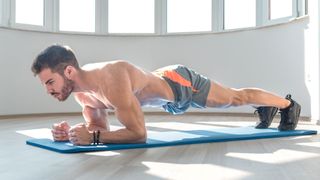Push-ups are a staple bodyweight compound exercise for strengthening your upper body, namely your pecs, triceps and anterior deltoids (the fronts of your shoulders), with or without weights. However, if you aren’t quite there yet, why not add the dolphin press to your exercise routine instead?
You just need one of the best yoga mats or similar to place beneath your elbows and know how to engage your core muscles properly to help execute the exercise properly. I once tried 90 dolphin push-ups for a fitness challenge, but the variation I recently started trying out tests shoulder and core strength and stability even more, improves shoulder health and builds upper body and posterior chain flexibility.
Here’s how to do it, and why you might want to.
What is the dolphin press exercise?
The dolphin press, similar to the dolphin push-up, is performed from the elbows; you’ll initiate the push-up movement with your chest and shoulders, then sweep the hips up and back into a downward dog — from the elbows at all times.
This reduces the overall range of motion, excluding elbow extension from the push-up. Although your triceps and chest work less during the dolphin press than the standard push-up, it’s a great gateway exercise that dials into shoulder mobility and builds foundational strength.
Your anterior deltoids and rotator cuff muscles (a group of muscles surrounding the scapulae that support shoulder movement) assist with push-ups, so building stronger shoulders will improve them and other push-up variations that more heavily target the shoulders, like wide-hand stance push-ups.
Any exercise that builds more mobile and flexible upper body muscles has the potential to provide gains elsewhere in weightlifting, so the dolphin press is definitely worth consideration during bodyweight workouts or mobility routines before exercise.
How to do a dolphin press

I recommend rolling out an exercise mat to support your elbows first. The exercise can be broken down into two movements: the first initiates a scapula push-up from the elbows, which I cover below, and the second mimics a forearm downward-facing dog.
- Start in a forearm plank position with your shoulders stacked over your wrists and hips aligned with your shoulders, resting on the balls of your feet
- Engage your core and squeeze your thighs and glutes to create a strong pillar
- With control, dip your chest toward the floor as you would during a regular push-up
- Press through your forearms and push upward, pulling your shoulder blades apart
- As you push upward, send your hips up and back
- Straighten your legs as much as possible and drive your heels toward the mat to perform a forearm downward dog
- Pause for the stretch, then return to the forearm plank. That’s one rep.
Benefits of the dolphin press for your upper body
Scap push-ups are brilliant for shoulder health, preparing shoulders for push-based exercises and moving the shoulder blades through protraction and retraction. Drawing the shoulders apart is protraction, pushing your chest away from the ground, and retraction draws the shoulder blades toward each other as you lower the chest.
The first part of the exercise initiates this, and it’s great for preparing shoulders for movement. The forearm downdog is brilliant for stretching the shoulders, upper back and back body (including your midback and hamstrings) and improving posterior chain flexibility.
I recommend 8-12 reps for 3 sets before exercise or during bodyweight workouts.
Mobile shoulders will improve your range of motion in pretty much any exercise that involves your upper body, including throwing, lifting and swimming. The shoulders are the most potentially mobile joints in your body, moving in various planes of motion. That means strong shoulders can make you more powerful, too.
Mobile shoulders can also improve balance (think handstands and handstand push-ups) and stability, helping to reduce the likelihood of injuries during sports and daily life. Besides, if you enjoy exercise like CrossFit, strong and mobile shoulders can help you handle complex lifts more efficiently and allow you to be versatile during bar-based work like kipping, pull-ups and toes-to-bar.
More from Tom's Guide
- I did 70 decline push-ups every day for a week — here’s what happened to my upper body
- Forget the gym — you only need 1 kettlebell and 20 minutes to strengthen your entire lower body
- Forget push-ups, it only takes 5 exercises to build your core and shoulders with this workout





















 English (US) ·
English (US) ·